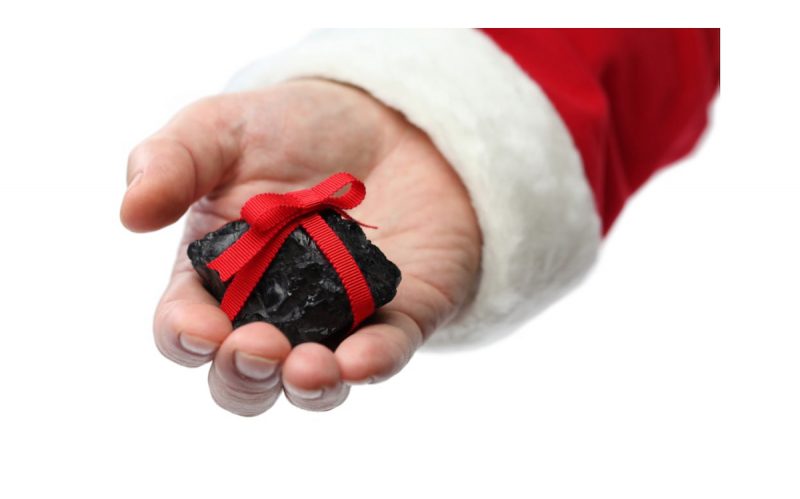Aquaculture NGO gives Trudeau a lump of coal this Xmas
“Prime Minister Justin Trudeau’s mandate to phase out ocean net pen salmon farming in British Columbia flies in the face of the region’s commitment to responsible aquaculture,” – Global Aquaculture Alliance (GAA).
By Fabian Dawson
SeaWestNews
Prime Minister Justin Trudeau got a lump of coal this Christmas for his party’s pledge to phase out ocean net pen salmon farming in British Columbia by 2025, which experts and scientists have described as unrealistic.
“Trudeau’s mandate to phase out ocean net pen salmon farming in British Columbia flies in the face of the region’s commitment to responsible aquaculture,” said the Global Aquaculture Alliance (GAA).
In a statement to SeaWestNews, GAA, an international non-governmental organization (NGO) dedicated to advocacy, education and leadership in responsible aquaculture, said B.C. should instead be “praised for its commitment to responsible aquaculture.”
Earlier in a pre-Christmas post on LinkedIn, GAA’s communications manager Steve Hedlund said, “Trudeau is putting politics before common sense. It’s a shame.”
The GAA said British Columbia has embraced the Best Aquaculture Practices (BAP) third-party certification program since the inception of the BAP salmon farm standards in June 2011.
“Cermaq Canada’s Brent Island salmon farm, near Campbell River, was the world’s first salmon farm to attain BAP certification eight years ago this month.
At the five-year anniversary of the first BAP-certified salmon farm, British Columbia was the world’s only region with 100 percent of its Atlantic salmon farms BAP certified.”
The BAP program is an international certification system that verifies processes for seafood farmers in every phase of their operations to ensure food safety, environmental integrity, social responsibility, animal welfare and traceability. There are more than 700 BAP-certified facilities now around the world. This includes 77 salmon farms in British Columbia, five processing plants and nine hatcheries.
In addition to the BAP certification, 38 BC salmon farms are certified to the Aquaculture Stewardship Council (ASC) sustainability standard. The ASC certification is an all-encompassing sustainability standard and all BC Atlantic salmon producers are committed to being certified.
The Swanson Island farm in the Broughton Archipelago, operated by Mowi Canada West, was the latest in B.C. and the company’s 25th farm, to achieve certification to the ASC salmon standard.
To achieve the ASC Salmon Standard certification, farms are audited against 500 separate aspects of the site’s performance. It is the gold standard in environmental and social certification and was developed through a dialogue process involving Environmental NGOs and researchers.
“Growing healthy, high quality salmon requires hard work and dedication,” said Mowi Canada West Managing Director Dr. Diane Morrison.
“Our staff are passionate about their salmon and understand the importance of maintaining the high standards that ASC demands. 100% ASC certification at all Broughton sites is something that they all should be very proud of.”
The B.C. Salmon Farmers Association, said despite the pledge to phase out ocean net pen salmon farming in B.C., its members will continue with their commitment to meeting the requirements of independent, audited, third-party certification systems.
“These certifications show a commitment to transparency, upholding high standards for operations, and ensures that companies are producing salmon in a sustainable, safe and ethical manner,” said the association.
Trudeau in his mandate letter earlier this month to the new Minister of Fisheries and Oceans, Bernadette Jordan, instructed her to “work with the province of British Columbia and Indigenous communities to create a responsible plan to transition from open net-pen salmon farming in coastal British Columbia waters by 2025.”
This about-face mid-campaign pledge, pushed by the anti-salmon farming lobby, got the Liberals to cave in on their vows and sacrifice over 7,000 sustainable livelihoods, in exchange for urban votes, said the industry.
Global aquaculture experts, scientists and the industry have also labelled this move as unrealistic, reckless and destructive because growing the global supply of salmon on land would require the same amount of energy per year needed to power a city of 1.2 million people and contribute to higher CO2 emissions.
Raising land based Atlantic salmon also costs 12 times more than ocean farming.
“This (The Liberal pledge) is a reckless policy, not grounded in science, and it will threaten good middle-class jobs across Canada,” said Timothy Kennedy, President & CEO of the Canadian Aquaculture Industry Alliance.
“There is no evidence that B.C. salmon farms are harming wild salmon populations…No other nation has proposed this requirement of their salmon production.”
A new scientific paper written for the High Level Panel for a Sustainable Ocean Economy, which Trudeau is part of, has said growing fish on land, will put intense pressure on freshwater resources.
Land-based aquaculture competes with other sectors for freshwater and land for production sites — neither of which are as constraining for ocean-based aquaculture production, states the report entitled ‘The Future of Food from the Sea’.
Global aquaculture insurance giant, described the Trudeau pledge and the 2025 timeline as “unrealistic”
“There is a lack of experienced management in this area that can’t be built up in five years…and I am not sure who is going to insure these land based fish farms,” said the company’s global head of aquaculture insurance, Geir Myre.
“We just don’t have the expertise, the risks are high and so far most of the plans for recirculating aquaculture systems (RAS ) are based on projections and not proven reality.
“There is a lack of knowledge, expertise and fully tested technology in this area that cannot be built up in five years,” Myre told SeaWestNews.

